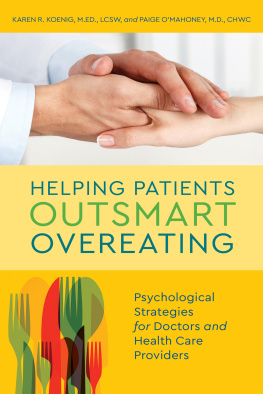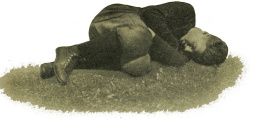Praise for Helping Patients Outsmart Overeating
Despite evidence that diets dont work for sustaining weight loss, many doctors are unaware of other options for their overweight patients. This book provides more effective ways to end dysfunctional eating and promote healthy attitudes and behaviors around food. Using these insights and strategies from the field of eating disorders treatment, medical professionals can more successfully help patients who are challenged by overeating.
Leigh Cohn , M.A.T., C.E.D.S., editor-in-chief, Eating Disorders: The Journal of Treatment and Prevention
Finally, a weight-inclusive book aimed at physicians and health care providers that puts the focus on health, rather than weight. All too often patients avoid seeing their doctors because of self-shame around their weight, which in the long run hurts health. This compassionately written book describes the psychological complexity around dysregulated eating, weight bias, and self-care. Ultimately, health care providers will learn how they can help their patients, with the bonus that they may discover solutions to their own unresolved issues around weight and eating. And who better to learn this from than one of their ownwritten by a therapist, Karen R. Koenig, and a physician, Paige OMahoney?
Evelyn Tribole , M.S., R.D., coauthor of Intuitive Eating
At a time when physicians are challenged with less time in the exam room, and more patients struggling with unhealthy diets, this book may be the psychological tool that finally helps motivate healthy change. If your doctor doesnt have this book, bring it to your next appointment.
Heidi Godman , health journalist, host of Health Check with Heidi Godman
This wise and insightful book is an invaluable resource for a wide range of professionals who treat seemingly intractable weight and eating problems. As a clinician and researcher of the diet-binge cycle for many decades, I welcome both its clarity and its compassion in guiding patients to a healthier relationship with food and their bodies.
Emily Fox-Kales , Ph.D., author, Body Shots: Hollywood and the Culture of Eating Disorders ; founder and director, Feeding Ourselves
A handy resource for all health care practitioners who want to help patients address their eating in a compassionate, sensitive, and motivating way! This beneficial guide is filled with solid tips for facilitating a healthy mindset around food and weight and to-the-point chapter summaries from two health care providers who express their passion about quality care!
Susan Albers , M.D., clinical psychologist and New York Times bestselling author of EatQ and Eating Mindfully
Helping Patients Outsmart Overeating
Psychological Strategies for Doctors and Health Care Providers
KAREN R. KOENIG, M.ED., LCSW, AND PAIGE OMAHONEY, M.D., CHWC
ROWMAN & LITTLEFIELD
Lanham Boulder New York London
Published by Rowman & Littlefield
A wholly owned subsidiary of The Rowman & Littlefield Publishing Group, Inc.
4501 Forbes Boulevard, Suite 200, Lanham, Maryland 20706
www.rowman.com
Unit A, Whitacre Mews, 26-34 Stannary Street, London SE11 4AB
Copyright 2017 by Karen R. Koenig and Paige OMahoney
All rights reserved . No part of this book may be reproduced in any form or by any electronic or mechanical means, including information storage and retrieval systems, without written permission from the publisher, except by a reviewer who may quote passages in a review.
DISCLAIMER
While we hope that the information contained herein will be helpful to you, please note that this book is intended for informational and educational purposes only. For health care providers, the information may not be applicable or appropriate for every patient or practice situation. The authors do not provide medical or psychological assessment, advice, or individualized therapeutic interventions. This book is not intended to substitute for a health care providers professional evaluation and assessment of an individual patient. Further, it is not intended to substitute for personal consultation with your health care provider regarding your individual medical or mental health situation. The authors and publisher specifically disclaim any and all liability arising directly or indirectly from the use of any information contained in this book. Mention of products, techniques, methods, resources, approaches, or other entities in this book does not indicate endorsement by the authors or publisher.
British Library Cataloguing in Publication Information Available
Library of Congress Cataloging-in-Publication Data
Names: Koenig, Karen R., 1947 author. | OMahoney, Paige, author.
Title: Helping patients outsmart overeating : psychological strategies for doctors and health care providers / Karen R. Koenig and Paige OMahoney.
Description: Lanham : Rowman & Littlefield, [2017] | Includes bibliographical references and index.
Identifiers: LCCN 2016025052 (print) | LCCN 2016026341 (ebook) | ISBN 9781442266629 (cloth : alk. paper) | ISBN 9781442266636 (electronic)
Subjects: LCSH: Eating disordersPsychological aspects. | FoodPsychological aspects. | Physician and patientPopular works | Medical personnel and patientPopular works.
Classification: LCC RC552.E18 K633 2017 (print) | LCC RC552.E18 (ebook) | DDC 616.85/26dc23
LC record available at https://lccn.loc.gov/2016025052
 The paper used in this publication meets the minimum requirements of American National Standard for Information SciencesPermanence of Paper for Printed Library Materials, ANSI/NISO Z39.48-1992.
The paper used in this publication meets the minimum requirements of American National Standard for Information SciencesPermanence of Paper for Printed Library Materials, ANSI/NISO Z39.48-1992.
Printed in the United States of America
KRK: This book is dedicated in memoriam to my cousin, Laurie Dunn.
POM: To my family, former patients, clients, mentors, and teachers, who have inspired and nurtured this book.
Contents
Kudos to our agent, Janice M. Pieroni of Story Arts Management, who was behind the mission of this book 100 percent from the get-go. We thank Rowman & Littlefield and Suzanne Staszak-Silva for partnering with us to bring this book to fruition. Thanks as well to Grier Ferguson for administrative support, especially for her attention to detail, and to Tracy Tylka, Ph.D., for sharing her expertise on the research in this area.
Finally, we would like to thank the health and mental health professionals, researchers, patient advocates and others whose work we have highlighted throughout the pages of this book. We are grateful to them for helping to change the patient-provider conversation that traditionally has been about diets and weight, to one increasingly focused on promoting sustainable health and wellness through enhancement of patients self-worth, self-compassion, self-efficacy and self-care no matter what their size.
As a lifestyle medicine practitioner, trained as both a physician and a health coach, I work with patients who want to lose weight and I teach physicians and health care providers how to work with patients on adopting regular exercise, nutritious eating patterns, and stress resiliency. I am acutely aware of the need for practical tools in this area. Paige and Karen have mapped out a play-by-play instruction manual on how to engage patients in their own self-care, with a focus on adopting healthy habits.
Research and clinical experience demonstrate that when patients focus on sustaining healthful behaviors versus losing weight, they are happier and healthier. How to accomplish this is not currently part of the medical school curriculum. However, we are trying to change that. This book is one big step forward in the journey to transform medical care. Practitioners can fill the gap in their own medical training by reading this book and learning how to speak to patients so that they will listen and, more importantly, so that they will tell you what they really need in order to feel and be well.
Next page










 The paper used in this publication meets the minimum requirements of American National Standard for Information SciencesPermanence of Paper for Printed Library Materials, ANSI/NISO Z39.48-1992.
The paper used in this publication meets the minimum requirements of American National Standard for Information SciencesPermanence of Paper for Printed Library Materials, ANSI/NISO Z39.48-1992.